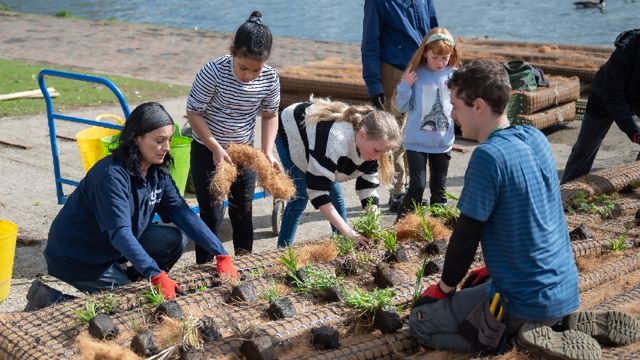Southmere Lake is now home to more than, 3,000 new plants, thanks to newly installed floating islands which local residents helped to create.
The community was invited to take part in two activity days where they learnt how to construct and add plants to five new floating wetlands. Two of the islands have space for bird nests which the community also helped to build.
Housing association Peabody and environmental charity Thames21 worked in partnership to carry out planting sessions with local residents which were designed and manufactured by ecological technology firm Biomatrix Water Solutions.
Peabody owns and manages five lakes and seven kilometres of canal network in Thamesmead, where looking after the landscape is a major part of its long-term plan to improve, grow and look after the town.
The housing association has now added 1,100 square metres of floating reedbeds to five canal areas in Thamesmead, including Birchmere Lake and Gallions Lake, which recently saw residents help to add hundreds of plants to a similar set of newly installed floating wetlands.
Each wetland at Southmere Lake is almost seven metres long and, with the new plants now in place, will help to deliver a range of benefits for local wildlife. This includes: providing shelter for birds; creating a subsurface forest of roots which will provide food and shelter for fish; and purifying the water.
These improvements are the latest in a series of changes that have been made at Southmere Lake since 2019. Following Peabody’s investment of more than £2.5million the lake has benefited from:
-
planting at the lake edges where vegetation helps to remove impurities
-
the removal of silt and impurities
-
the addition of a 23m-high fountain which adds oxygen to the water to support wildlife
-
a fish-free channel for tadpoles and insect larvae to thrive
-
improved access to the water’s edge
Desiree Shepherd, Peabody’s Public Realm and Landscape Manager for Thamesmead, said: “It’s wonderful to see the community come together and learn new skills while making improvements to Southmere Lake. The floating wetlands are not only beneficial to wildlife, but are also there for people to enjoy when visiting the lake. These floating islands create new habitats and help make our waterscapes more biodiverse.”
Liz Gyekye, Communications Manager at Thames21, said: “It was brilliant to encourage the involvement of local people to learn more and make a difference to their local lake. Working in partnership with communities helps to foster a sense of community ownership and will help to ensure that communities protect their blue spaces for future generations. Blue spaces in Thamesmead can face a number of challenges, including run off from road networks and sewage pollution. So, it’s been great to work with dedicated volunteers and our partners to take this opportunity to transform Southmere Lake for wildlife and for people.”
Ellen Hebdon, Operations Manager at Biomatrix, said: “Following the success of the previous islands, it was great to be involved in the delivery of this second phase. Made from recycled, non-toxic materials our ecosystem islands create multiple layers to support a greater range of biodiversity – above the water a range of plant species and nesting areas, below the water a micro-wilderness of plant roots all of which increase habitat and, over a period of time, naturally cleanse the water. The islands also bring amenity to the local community and one of the best elements of any project installation is being able to see the delight on the volunteers’ faces when they help to assemble and plant the islands.”
It’s not just aquatic planting that residents have assisted with in Thamesmead in recent weeks. Over at Manorway Green Park, the local community helped replant more than 270 trees after 60 trees had to be removed due to disease which accelerated partially due to the effects of climate change.
Peabody arranged two tree planting activities – one with Camouflage Café who are based in the Moorings, and one with residents living in the area surrounding Manorway Green. The new trees will respond better to climate change and will also increase biodiversity.
Jack Gower, Peabody’s Landscape Activation Manager for Thamesmead, said: “The removal of the trees at Manorway Green had a significant impact on the look of the park, as well as its biodiversity. It was important for us to replant as many trees as we could while involving the local community in the process. We’re incredibly grateful to everybody who took time out of their day to spend the afternoon getting their hands dirty with us. Not only will this help the landscape to visibly flourish, but it will also provide many environmental benefits for local wildlife.”
Find out more about the work that Peabody is doing to enhance and maintain Thamesmead’s landscape here.

